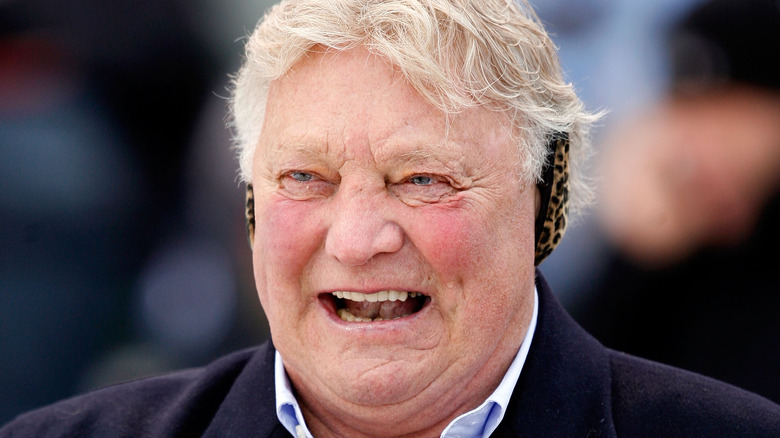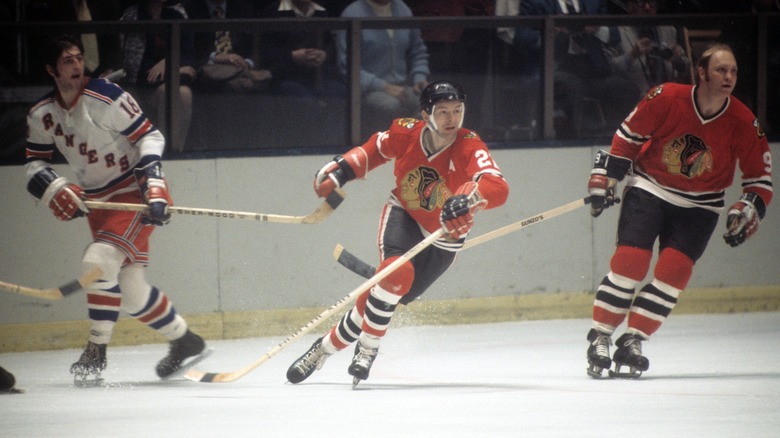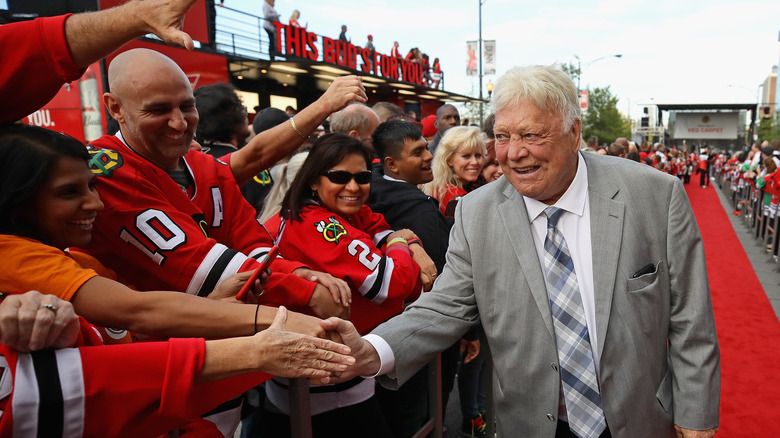The Hockey Stick Rule That Completely Changed Bobby Hull's Shooting Game
Bobby Hull, the Hall of Fame inductee who was one of the National Hockey League's (NHL) superstars in the 1960s and '70s, was known for the velocity of his slap shot. His nickname, the "Golden Jet," accounted for his power and blond hair. Per ESPN, over the course of 15 seasons with the Chicago Blackhawks, Hull became the first player in NHL history to score more than 50 goals in a season, which he did five times in Chicago. He peaked at 58 during the 1968-1969 season. Few can question Hull's hockey prowess, but he may have also gained an edge by embracing what became known as the "banana blade."
In the early 1960s, Hull and his teammate Stan Mikita fell into a game-enhancing equipment modification by total accident. During a practice session, Mikita caught his straight-blade hockey stick in the boards, which curved the blade. The locker room was too far away. So, instead of grabbing a new stick, Mikita kept practicing with the splintered stick and found the deformity provided more power. "The puck not only sounded different but it acted different coming off that curved blade. I took a few more shots. Same thing," Mikita said, per The Athletic. "The pucks came off at different angles and with more velocity than they would with a straight blade." Mikita and Hull then began intentionally warping the wooden blades of their sticks by soaking them in hot water and pushing them under their door jambs overnight.
Making the perfect curved stick
Mikita wasn't yet satisfied with the curve. He continued experimenting with different woodworking techniques, which involved heating and cooling the wood. There were blow torches and ice baths. He even borrowed the Blackhawks' medical staff's hydrocollator in an attempt to make the blade even more flexible. "Eventually we latched on to the propane torches that the trainers were using," Mikita said (via The Athletic). "You'd get the wood soaked first so it wouldn't leave scorch marks on the blade." Mikita also noted that for all the power he and Hull gained, there were also downsides — notably being able to handle the puck on a backhand pass.
Hull's extra speed, which was clocked between 97 and 120 miles per hour (via The New York Times), was immediately noticeable to everyone. But for Hull, the biggest advantage of the modified hockey stick wasn't necessarily the speed. As he explained it, the edge he gained was in the way he was able to handle the puck — nobody knew what was coming. "I can pull the puck in and shoot it all in one motion before the goaltender knows I'm shooting," Hull told Time magazine. "The hook hugs the puck, and I can get a little action on it. It'll drop or rise, and I know which way it's going by the way I follow through." Before long, players across the NHL began adopting the so-called "banana blade" that Mikita and Hull were playing with, according to CBC.
Unrest among goalies
Goalies, who mostly didn't wear masks on the ice, were none too happy about facing the speed the curved sticks provided. The Los Angeles Kings' Wayne Rutledge told Time that curved sticks should be banned. Hull's own Chicago teammate, goaltender Dave Dryden, said that at a bare minimum, goalies should have their own curved sticks, telling the magazine, "That way, we can fire the puck back at them." The NHL responded by implementing a rule — soon dubbed "the Bobby Hull Rule" — which limited the curvature of the blade. The rule originally limited the curvature to a range of 0.5 inches to 0.75 inches, per Yahoo! Sports. In 1970, the limit was set at 0.5 inches. These days, the NHL allows up to a 0.75-inch curve.
In a career that spanned four decades, Hull ended his professional hockey years, having played in 1,063 NHL games, accumulating 610 goals, 560 assists, 1,170 points, and 640 penalty minutes, per the NHL. He also racked up multiple trophies, including a Stanley Cup Championship in 1961 with the Chicago Blackhawks. But he also tallied up injuries as age wore on, and he officially retired in 1980, despite a comeback attempt or two. According to The New York Times, post-retirement, Hull faced several domestic abuse charges, had run-ins with the law, and made anti-Semitic and racist comments. On January 30, 2023, Bobby Hull died at the age of 84. No cause was disclosed at the time.


